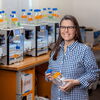As the old saying goes, you can't eat scenery
Maine's role in becoming a food hub is one I've heard a lot of conversation about in the past year.
Like many states, Maine struggles with changes in the economy, global competition, an aging demographic, a lack of skilled workers, changing consumer tastes and on and on. There are all kinds of good things going on, but when you look at resources and what Maine has to offer, there are many who keep coming back to this: Maine has an abundance of agricultural land and sea resources and there is a clear demand for quality food at a reasonable price. Couldn't the state produce more of not only what Mainers need but the rest of the country needs as well?
At a lunch I had with U.S. Sen. Angus King and his staff, they pointed out the enormous percentage of food that Maine must “import” over the Piscataqua River at Maine's southern border. They asked: Why couldn't more of that be grown or produced in Maine?
Talking to Peter Vigue, chairman of Maine's largest construction firm, Pittsfield-based Cianbro Cos., he lamented Maine's economy being “stuck in a rut.” But he urged the public and private sectors to get together to figure out how Maine can become more of a food center.
It could be argued that Bill Haggett, who at one time led the defense contractor Bath Iron Works and now oversees the Pineland Farms Food Group and its $100 million business of producing cheese, natural meats and potato products, illustrates how significant food production has become in the state. Rodney McCrum, who grew up on a potato farm in Aroostook County, figured out how to turn a commodity into a value-added product, a prepared mashed potato that could be sold in Applebee's restaurants or in Hannaford stores under the Pineland Farms Naturally Potatoes label. Noting the growing demand for food products, Libra Foundation, which was founded with money from microprocessors, has invested in Pineland Farms and Naturally Potatoes. Elsewhere, farmers who cannot get conventional bank financing are turning to investment firms like Wiscasset-based CEI for targeted agriculture loans, sometimes for less than $10,000, with repayment schedules to match cash flow.
Portland's restaurant scene has gained national attention, but at least part of its success is based on the farm-to-table movement and the access to fresh foods.
On Maine's journey to becoming a food hub, distribution and processing remain major issues. Rural farmers are often at the end of the road, making trucking and transportation a major expense. Processing remains a challenge for various food producers: A significant portion of Maine's lobsters are processed and packed in Canada. Likewise, much of the wheat grown here is processed in Canada. The Maine blueberries Rockland-based Bixby & Co. uses in its chocolate bars must be sent to Michigan to be dehydrated. Cattle raised at Pineland Farms' Fort Fairfield facility are sent to Pennsylvania to be slaughtered.
Much of Maine's success in becoming a food hub does and will continue to depend on farmers. As Senior Writer Lori Valigra discovered on three recent visits to organic farms is that, whatever you might pay for a Maine product at a downtown restaurant or at Whole Foods, you may be more likely to find a farmer hunched over a calculator than a tractor. Dollars and cents matter. As Lori points out in the story, putting labels like “organic” on products is a pricey business, one fraught with costly upgrades and regulatory paperwork.










Comments